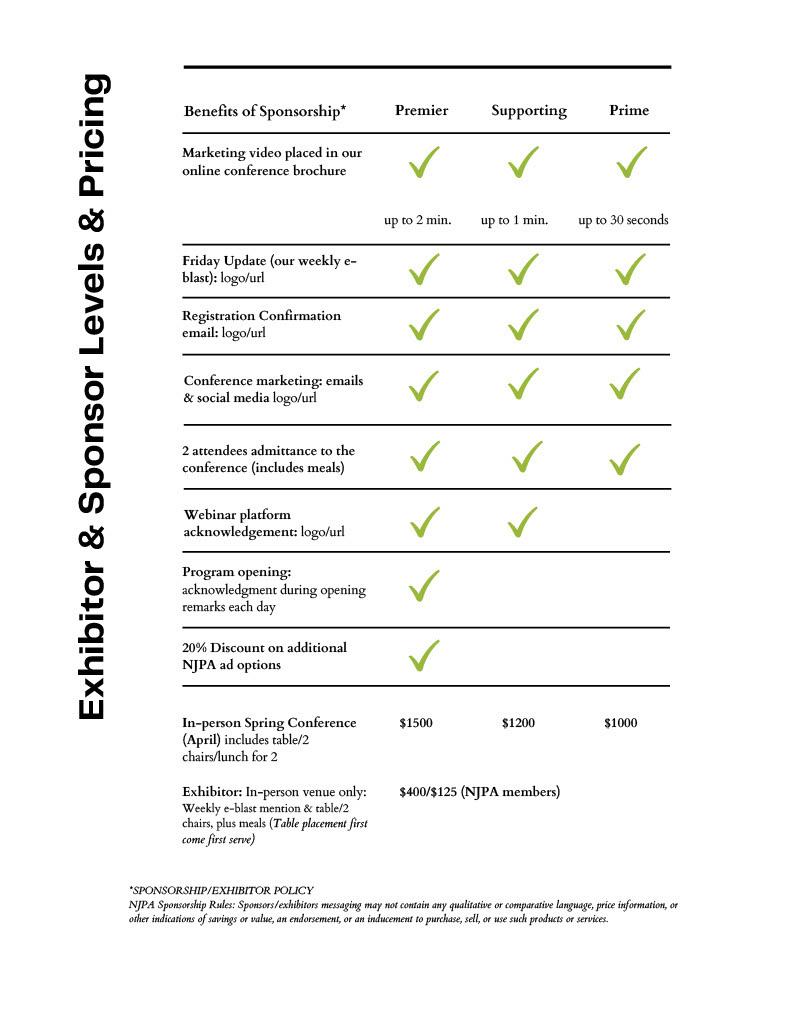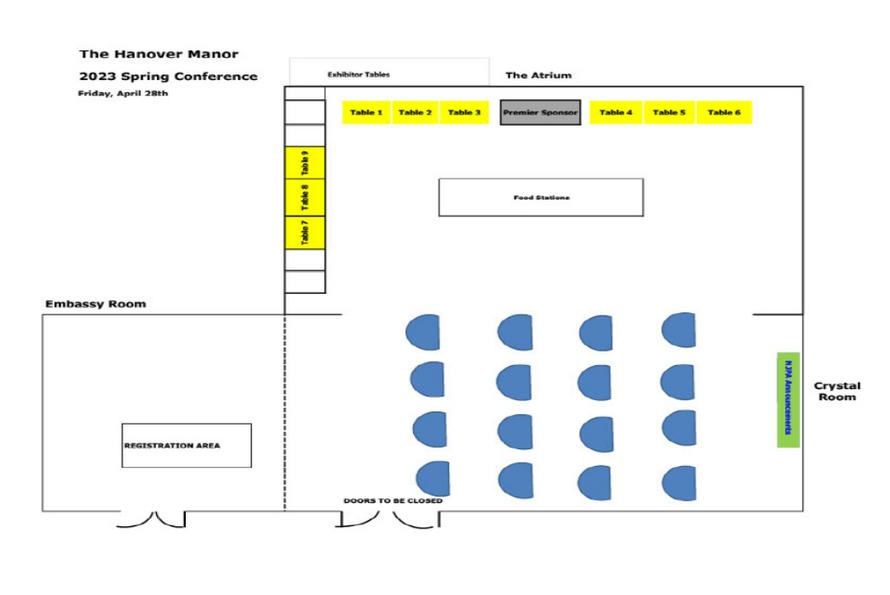
Friday, April 12th 8:00am - 4:00pm Sponsorships & Exhibiting Available




Friday, April 12th 8:00am - 4:00pm Sponsorships & Exhibiting Available


8:00am-9:00am:Registration/Breakfast/Networking
9:00am-9:10am:Welcome/HousekeepingNotes
9:10am-10:40am:CommercialSexualExploitationandSexTraffickingofChildrenandTeensinthe
UnitedStates:Myths,Facts,andInnovatingtheClinicalFrame(1.5CE)
KeynoteSpeaker:AbigailJudge,PhD
20-minutebreak
11:00am-12:00pm:Adolescence:RevisedandRedefined(1CE)
Presenter:MichaelOsit,EdD
12:00pm-1:00pm:LunchBreak/Networking
1:00pm-2:30pm:TheImpactofAffairsontheDivorceandCo-ParentingProcess(1.5CE)
Presenters:SharonRyanMontgomery,PsyD;TamsenThorpe,PhD;MarcyPasternak,PhD
2:30pm-4:00pm:FutureForward:GettingAheadoftheSocialMedia&YouthMentalHealthCrisis (1.5CE)
Presenter:JenniferLibby,MSW,LCSW
4:00pm:EndofDayAnnouncements

The New Jersey Psychology Association (NJPA) is approved by the American Psychological Association to sponsor continuing education for psychologists. NJPA maintains responsibility the program and its content.
NJPA is recognized by the New York State Education Department's State Board for Psychology as an approved provider of continuing education for licensed psychologists #PSY-0076.
354 Eisenhower Parkway Plaza 1, Suite 1150
Livingston, NJ 07039
973-243-9800
njpa@psychologynj.org
www.psychologynj.org

Early Bird Pricing! Register by March 1st:
NJPA Member: $210 | NJPA Sustaining Member: $179 78 | NJPA ECP $155
NJPA Students/Emeritus $105 | Non-Member $315
Register March 2nd through April 7th:
NJPA Member: $235 | NJPA Sustaining Member: $199 75 | NJPA ECP $175
NJPA Students/Emeritus $115 | Non-Member $350
Late Registration April 7th through April 10th:
NJPA Member: $270 | NJPA Sustaining Member: $229.50 | NJPA ECP $200
NJPA Students/Emeritus $135 | Non-Member $405
Register Here!

The New Jersey Psychology Association (NJPA) is approved by the American Psychological Association to sponsor continuing education for psychologists. NJPA maintains responsibility the program and its content.
NJPA is recognized by the New York State Education Department's State Board for Psychology as an approved provider of continuing education for licensed psychologists #PSY-0076.
354 Eisenhower Parkway Plaza 1, Suite 1150 Livingston, NJ 07039 973-243-9800
njpa@psychologynj.org
www.psychologynj.org


Keynote Speaker Bio: Abigail Judge, PhD is a clinical and forensic psychologist who specializes in commercial sexual exploitation and sex trafficking, and she has worked with this population as a therapist, educator, consultant and expert witness since 2010. Dr. Judge co-directs Boston Human Exploitation and Trafficking (HEAT) at the Massachusetts General Hospital, a clinical and peer-led outreach program for women at the intersection of sex trafficking and substance use disorder. She is on the part-time clinical faculty at Harvard Medical School.
ProgramNarrative:
Thereisheightenedinterestamongpsychologistsincommercialsexualexploitationofchildren (CSEC)anddomesticminorsextrafficking(DMST),butpersistentmyths,sensationalizedmedia coverage,andresearchchallengeshavelimitedunderstanding Thisprogramwillprovidean introductiontotheprobleminNewJerseyandnationallywithafocusonbestpracticesin identification,engagement,andintervention.Psychologistscanplayauniqueroleinresponding totheseveretraumaassociatedwithsexualexploitation,butthisrequiresshiftsinclinical theory,practice,andlow-thresholdservicelocationtoovercomehistoricalmistrustamongyouth andfamiliescarriedoverfromdecadesofharm,racism,stigma,andcriminalizationmarking traffickedindividuals’experienceswithhealthcareandsupportsystems.Thepresenterhas workedwithsextraffickedyouthinarangeofrolesandsettingsandwilluseclinicalmaterial fromjuvenilecourt,inpatientpsychiatry,substanceusedisorderclinics,privatepractice,law enforcementconsultation,andstreetoutreachtoillustratediversepresentationsandcommon themestoinformclinicalintervention.
LearningObjectives:
1
Afterattendingthisprogram,participantswillbeableto: Discusstheprevalence,scope,andindividualandstructuraldeterminantsofcommercial sexualexploitationofchildren(CSEC)anddomesticminorsextrafficking(DMST)inNew JerseyandtheUnitedStates.
2.DescribetheclinicalconsequencesofCSEC/DMSTandbestpracticesfortrauma-informed assessmentandintervention,withattentiontohigh-riskpopulations,eg,LGBTQIAand BIPOCyouth;traumabonding;substanceuse;childwelfareandjusticeinvolvement
3 Proposewaystoimproveyourorganization’scapacitytoservethisuniquepopulation, includinghowtobuildthecross-sectorcommunity-basedcollaborationsthatthiswork requires,e.g.,lawenforcement,survivorleaders,NGOs.
LevelofLearning:Intermediate
TargetAudience:Psychologists,Psychiatrists,SocialWorkers,Nurses,Educators,MentalHealth Counselors,MarriageandFamilyTherapists,GraduateStudents,UndergraduateStudents
Keynote Speaker: Abigail Judge, PhD
Presenter:
Michael Osit, EdDPresenter Bio: As a practicing psychologist with over 40 year’s experience, Dr. Osit has a vast experience working with children,, adolescents, families, couples and adults. Dr. Osit is a frequent presenter both locally and nationally on a wide variety of topics for professionals, parents, schools, and agencies. In addition to his clinical work, Dr. Osit is the author of “Generation Text: Raising Well-Adjusted Kids In An Age Of Instant Everything,” (Amacom, 2008) and The Train Keeps Leaving Without Me: A Practical Guide To Happiness, Freedom, & SelfFulfillment” (KDP Publishing, 2016). He also authors a column entitled, “Mind The Mind” appearing in a bi-monthly NJ publication called Connections, and has been a regular contributor to The Huffington Post Lifestyle/Parenting section.
Program Narrative:
The 21st Century teenager is faced with a markedly more complex and very different world compared to how their parents and their therapists experienced adolescence. This presentation identifies how the cultural and technological factors uniquely impact the new-age teenager. These factors create new issues and magnify issues already associated with this tumultuous developmental stage of life. Strategies and clinical approaches to work with today’s teen are also presented.
Learning Objectives:
1. To identify the impact that cultural and technological factors are having on today’s teenagers.
2. To identify and increase awareness of the differences that the 21st century adolescent experiences as compared to both previous generations, and specifically, the adolescent experiences of parents and clinicians.
3. To provide clinical strategies to address the unique differences in the developmental stage of adolescence as compared to other generations of adolescents.
Level of Learning: Intermediate
Target Audience: Psychologists, Psychiatrists, Social Workers, Nurses, Educators, Mental Health Counselors, Marriage and Family Therapists, Graduate Students, Undergraduate Students

Presenter: Tamsen Thorpe, PhD

Presenter: Sharon Ryan Montgomery, PsyD

Presenter: Marcy Pasternak, PhD
Presenters Bios: Dr. Thorpe and Dr. Montgomery both practice in Morristown, NJ, and Dr. Pasternak practices in Watchung, NJ. All three specialize in matters of family law, and counseling children, couples, and families going through transitions such as divorce.
Program Narrative:
As mental health professionals, we know how difficult it can be to assist individuals and families negotiating the divorce process, especially when children are involved. One of the most inflammatory factors that we encounter is when there has been infidelity. It is helpful to understand the dynamics of affairs and the negative consequences that may ensue. Providing early psychoeducation and effective interventions can be crucial to the outcome of these complex matters. Specifically shifting the self-focus that involved adults, often have, onto the welfare and best interests of their children can make a critical difference.
Learning Objectives:
After attending this program, participants will be able to:
1.
Identify trends and types of affairs.
2. Describe the impact of affairs on adults, and how they challenge the divorce process.
3.Detail the effects on children, and how to soften the repercussions.
Level of Learning: Intermediate
Target Audience: Psychologists, Psychiatrists, Social Workers, Nurses, Mental Health Counselors, Marriage and Family Therapists, Graduate Students.

Presenter: Jennifer Libby, MSW, LCSW
Presenter Bio: Jennifer Libby has been a psychotherapist for over 20 years treating at-risk adolescents. In 2019, in response to the massive increase in teen suicide, school violence and the failures of the tech and mental health industries, Jennifer joined with a team of Gen Z leaders to bring her practical, clinically indicated approaches to managing mental health challenges through a scalable digital solution and social change movement. She leads the team’s Caucus & advocacy efforts in Congress and the White House, is a regular speaker on the subjects of mental health and technology, including at the Kennedy Forum and Accenture, and has been featured on numerous podcasts & corporate webinars. She also provides consultation to like-minded groups, including the Society for the Prevention of Teen Suicide, the Black Mental Health Brain Trust and the Center for Humane Technology (producers of the Social Dilemma).
Moderator: Marcy Pasternak, PhD
Program Narrative:
It’s no secret that there is and has been a youth mental health crisis way before the pandemic with youth suicide rates increasing over 60% in the last 20 years. Is it 100% social media or are there other factors that have contributed to the widespread mental health crisis we are facing? Further, what is being done at a policy level to mitigate the risk to children and teens right now and to increase research and resources that could be helpful? What are the forward-thinking leaders of tomorrow doing to create a better outcome with technology, AI, policy reform, and innovation? What can you do as a clinician to better inform, protect, and empower your clients in such a critical time?
Learning Objectives:
1
Identify specific harms with current social media trends and the associated reported outcomes.
2. Analyze current tech reform policies such as the bipartisan KOSA (Kids Online Safety Act) and potential implications for clinicians.
3. Identify a variety of accessible tech innovations to meet the needs of youth right now while also learning about new corporate structures.
Level of Learning: Intermediate
Target Audience: Psychologists, Psychiatrists, Social Workers, Nurses, Educators, Mental Health Counselors, Marriage and Family Therapists, Graduate Students, Undergraduate Students


